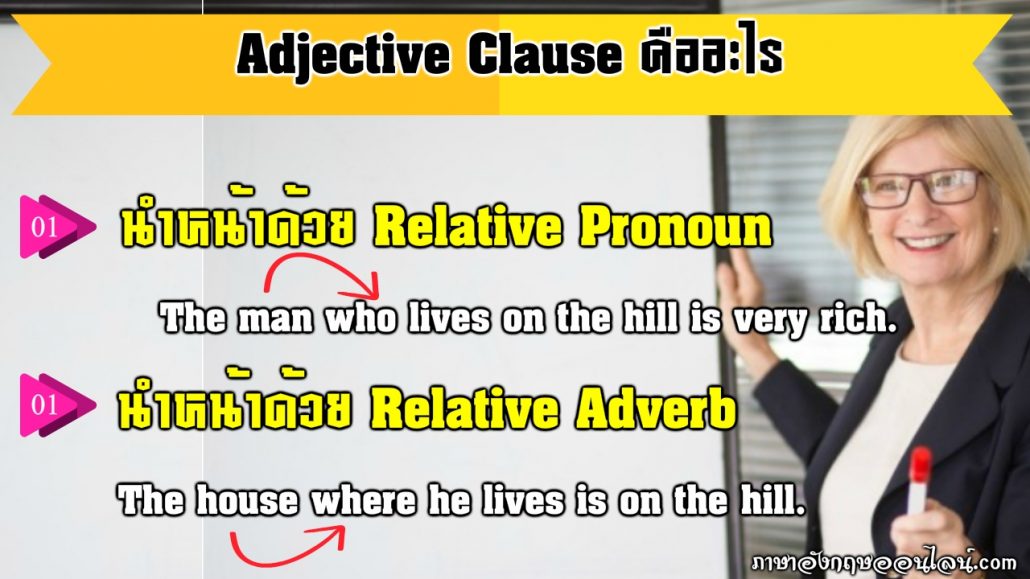Adjective clause คือ อนุประโยคที่ทำหน้าที่ขยายคำนาม ถ้ารู้ได้เรียนรู้เรื่อง adjective มาแล้วมันก็คืออันเดียวกันนั่นแหละ แต่อันนี้จะยาวๆหน่อยแค่นั้นเอง

Adjective Clause คืออะไร
- adjective แปลว่า คำคุณศัพท์
- clause แปลว่า อนุประโยค
- adjcetive clause แปลว่า คุณานุประโยค คือ อนุประโยคที่ทำหน้าที่เป็นคำคุณศัพท์
Adjective Clause สรุปง่ายๆคือ คำคุณศัพท์ที่มาในรูปอนุประโยค ส่วนหน้าที่ก็ขยายคำศัพท์เหมือน adjective นั่นแหล่ะครับ ในบางตำราเรียกว่า relative clause
อ่านเพิ่มเติม > sentence ประโยคคืออะไร
อ่านเพิ่มเติม > clause อนุประโยคคืออะไร
อ่านเพิ่มเติม > Relative clause คืออะไร
ในระดับพื้นฐานเราจะเรียนรู้ ajective เป็นคำๆ เช่น big, small, tall, short, red, black etc.
- a big dog สุนัขตัวใหญ่
- a small bird นกตัวเล็ก
The dog is very big. It is in the small room.
สุนัขตัวใหญ่มาก มันอยู่ในห้องเล็กๆ
ปกติ adjective ที่เป็นคำๆ จะขยายลักษณะของคำนาม จากตัวอย่างด้านบน คือ คำว่า big กับ small
ส่วน adjective clause ก็ขยายคำนามเหมือนกัน แต่จะยาวๆหน่อย ถ้าใครเขียนแบบนี้จะเป็นตัวบ่งบอกว่ามีทักษะในการเขียนไม่ธรรมดา จากตัวอย่างด้านบนเรามาเขียนใหม่ให้ดูดีขึ้นดังนี้
The dog which is very big is in the room.
สุนัขตัวที่ใหญ่มากอยู่ในห้องเล็กๆ
which is very big ตัวที่ใหญ่มาก เป็น adjective clause
The dog which is in the room is very big.
สุนัขตัวที่อยู่ในห้องเล็กๆตัวใหญ่มาก
which is in the room ที่อยู่ในห้อง เป็น adjective clause
เป็นอย่างไรบ้างครับ เห็นไหมว่ามันดูดีคล้ายมือโปรมากยิ่งขึ้นเลยทีเดียว
ตัวอย่าง Adjective Clause
Adjective Clause จะนำหน้าด้วย
1. Relative Pronoun (who, whom, whose, which, that)
2. Relative Adverb ( where, when, why)
อ่านเพิ่มเติม > Relative Pronoun
นำหน้าด้วย Relative Pronoun
- The man lives on the hill. He is very rich.
- The man who lives on the hill is very rich.
- ชายผู้ที่อาศัยอยู่บนเนินเขารวยมาก
- who lives on the hill เป็น adjective clause ขยาย man
- You met the man at the party. He lives on the hill.
- The man whom you met at the party lives on the hill.
- ชายผู้ที่คุณพบที่งานเลี้ยงอาศัยอยู่บนเนินเขา
- whom you met at the party เป็น adjective clause ขยาย man
- The man’s house is on the hill. He is very rich.
- The man whose house is on the hill is very rich.
- ชายผู้ที่มีบ้านอยู่บนเนินเขารวยมาก
- whose house is on the hill เป็น adjective clause ขยาย man
- The house is on the hill. It belongs to this man.
- The house which is on the hill belongs to this man.
- บ้านที่อยู่บนเนินเขาเป็นของชายคนนี้
- which is on the hill เป็น adjective clause ขยาย house
- The house is on the hill. It belongs to this man.
- The house that is on the hill belongs to this man.
- บ้านที่อยู่บนเนินเขาเป็นของชายคนนี้
- that is on the hill เป็น adjective clause ขยาย house
นำหน้าด้วย Relative Adverb
- The house where he lives is on the hill.
- บ้านที่เขาอาศัยอยู่ อยู่บนเนินเขา
- where he lives เป็น adjective clause ขยาย house
- The day when he left his house was Monday.
- วันที่เขาออกจากบ้านของเขาคือวันจันทร์
- when he left his house เป็น adjective clause ขยาย day
- I know the reason why he lives on the hill.
- ฉันรู้เหตุผลที่เขาอาศัยอยู่บนเนินเขา
- why he lives on the hill เป็น adjective clause ขยาย reason
